Arts & Culture

As a theologian, ethicist, professor, priest, and author, Gary Dorrien has helped shape and excavate the overlap between social justice and faith for nearly 50 years. He has written definitively as a historian and prophetically as an activist, all while teaching generations as a professor of religion. Now, he explains why it was time to tell his own story.

The U.S. has always considered itself as this New Jerusalem — a land specially blessed by God — but also one that is only available to those specially chosen. And from the establishment of the United States as a nation, as Lin discusses, this drive to only welcome certain individuals has been heavily focused on questions of race and national origin. The notion that the U.S. is a nation that welcomes immigrants is a myth that contradicts historical record. Instead, our “[i]mmigration and naturalization laws serve ultimately to create the ideal population as conceived by those who set policy and legislate,” Lin writes.
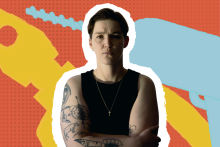
As Semler, Grace Baldridge has spent the past few years proving there was a space for people like her in the Contemporary Christian Music scene, even if she had to dig that space with her bare hands. Now, with the release of her debut album, she's looking back on how she did it — and what’s next.
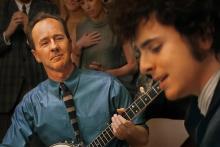
James Mangold’s A Complete Unknown is a striking film. Centered on a young Bob Dylan (Timothée Chalamet), the biopic chronicles the folk music community that bounced in and around 1960s New York City, offering stellar musical and acting performances in the process. But its wisest scene takes place off stage in an intimate conversation between Dylan and Pete Seeger (Edward Norton).

Fear turns me into a tree.
Every pruning healed
becomes an eye.
Sunlight plays the leaves,
each a pool of green incandescence,
a window to the heart.
Every wound a hieroglyph.
Each whisper a new chord.
Come inside my radiant dream:
a phoenix fruit ripens unseen.
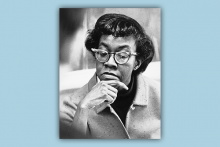
IN “KITCHENETTE BUILDING,” Gwendolyn Brooks, the first Black Pulitzer Prize-winning poet, considers the challenge of dreaming in grim places. The setting of this 1945 poem, published as part of Brooks’ first collection, A Street in Bronzeville, is the titular kitchenette building, a housing unit of many cramped, run-down apartments, often rented by Black residents in that era in cities like Chicago. Tenants are “grayed in, and gray,” worn out by systemic injustice and the demands of daily life, such as paying rent and putting food on the table. Still, the speaker — who speaks on the behalf of a collective “we” — wonders if a dream could rise “through onion fumes” and “sing an aria” in the building.
The dream in “kitchenette building” is delicate and “fluttering,” something that requires time and contemplation — luxuries that systemic oppression makes nearly impossible. Brooks’ biographer, Angela Jackson, in A Surprised Queenhood in the New Black Sun: The Life & Legacy of Gwendolyn Brooks, describes this poignantly: “Life is grim in these kitchenette buildings ... entrapment as in a prison. People here are not people; they are things, dehumanized by the nature of a system they did not volunteer for.” Later, she asserts that kitchenette residents “cannot even consider” a dream greater than a cold bath “[before] a realistic necessity comes up ... They take what they can get.”
Brooks makes it clear, though: Imagination is a vital precursor to liberation. “Kitchenette building” plants seeds in questions: What would happen if dreams of freedom and freshness had space to grow? What would liberation look like for Black communities and the U.S. as a whole?

Indie Imago Dei
In the title track of his new album, People Watching, indie rocker Sam Fender sees the face of God in the strangers he passes: “Envious of the glimmer of hope / Gives me a break from feeling alone / Gives me a moment out of the ego.” Polydor Records
Prophetic Dispatches
One Day, Everyone Will Have Always Been Against This is a lament and rallying cry from Egyptian-Canadian journalist Omar El Akkad. With honest prose, he debunks American “fiction[s] of moral convenience,” including ideologies that fuel U.S. support of a genocide in Palestine. Knopf
Saints and Sinners
Characters in Jared Lemus’ debut collection, Guatemalan Rhapsody, are as broken and beautiful as their country. Among them are a band of thieving siblings, who justify their crimes by invoking Saint Dismas: “He stole because he had to ... and God forgave him.” Ecco

JEAN-LUC GODARD'S 1967 anti-consumerist film Weekend is difficult to explain in the space of a column, but a single scene offers a cross-section of its absurdity.
A bourgeois married couple begin a road trip to kill the wife’s parents and inherit their fortune. Naturally, once the deed is done, they each intend to kill the other and run off with their respective lovers. But first, they must maneuver traffic.
A country road is frozen in bumper-to-bumper traffic, and for nine excruciating and exhilarating minutes, the camera methodically tracks along the road, gawking at the jam. Some people play chess in the roadway while others toss bouncy balls between vehicles; children have emptied out of a school bus and run through the grass; there are lions, a llama, monkeys; people lounge and flirt as the couple weaves through the mess. The scene is made even more chaotic by the insatiable, mechanical wail of competing car horns and screaming squabbles.
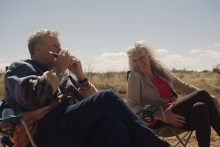
THE DAY AFTER I told my mother I was transitioning, I sat across from a childhood friend, who I’ll call Sarah, in Los Reyes, my favorite Mexican restaurant in my hometown. It was 2009, and I had come home from college specifically to give my mom the news. I hadn’t seen Sarah in six years but I remembered she had a strong faith that she shared openly and invitationally. As soon as I sat down, she asked how I was doing. Something in me broke open, yearning to be seen. I was a mess — sadness and anger dipping in and out of despair. I said something like, “My mom’s just never understood me, and now she’s not going to try to understand.” Sarah got quiet and nodded before replying, “So? I don’t understand either, but I’m here because I love you.”
Whatever I said in response doesn’t matter as much as the truth I learned: Friends and family can love and support one another without understanding them.
In last year’s documentary Will & Harper, Harper Steele, a trans comedy writer living in New York, has one such friend in the comedian Will Ferrell. At the beginning of the documentary, we learn that Steele announced the news of her transition via an email to her loved ones, Ferrell included. Upon hearing the news, Ferrell, who’s been friends with Steele since the two met on Saturday Night Live 30 years ago, is shocked but wants to be supportive — he’s just not sure how.
“So many of us don’t know what the rules of engagement are,” Ferrell says. “And in terms of our friendship and our relationship, it’s uncharted waters.” So he invites Steele to go on a road trip with him.
Ferrell describes Steele as a rough-and-tough, beer-drinking Midwesterner who loves finding seedy roadside bars and truck stops on cross-country drives. But both he and Steele are worried those dive bars will not be safe now that Steele is living as a woman. So the motivation for the trip is twofold: They can learn how to navigate the new circumstances of their friendship, and Steele can learn to navigate the places she’s always loved — this time as the person she’s always known herself to be.

I LOVE WORDS. I love etymological dictionaries packed with word genealogies. I love that apricot is a cousin to precocious, kitchen, and charcuterie. That the word word (from the Old English) is rooted in utterance and promise, in the theological sense. As in, to give one’s word.
Words spoken are different creatures than words written. Christians designated written words as more trustworthy than oral composition, but early Judaism prioritized oral transmission of sacred words — as many Indigenous communities do still. But written words (like these) can be controlled and manipulated. Writing prevents the breathed utterance from passing through the orator’s flesh to be inhaled by the communal body. Orality is to literacy as wildfire is to candle flame.
Maybe that is why I moved heaven and earth in 2000 to hear Irish poet Seamus Heaney read in person, accompanied by Liam O’Flynn on the uilleann pipes. Having studied Heaney’s written word, especially the collection Station Island, I wanted to hear the man himself, to hear him orate (from the roots of utter and praise before an assembly). I wanted to inhale his language (tribal and tongue).

Lynch, who died this month days before his 79th birthday, was fascinated by the coexistence of light and dark in the world, the effects of our sinful impulses on others, and what can happen when we pursue what’s right.
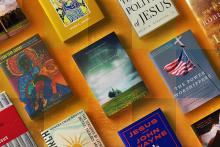
Since our earliest issues, Sojourners has maintained that culture coverage is just as much a part of our mission to articulate the biblical call to social justice as news stories and commentaries. And after reviewing the list below, we suspect you’ll see why. The books on this list span many genres, but they all circle the same core question: What does our faith call us to do in the face of injustice?

Prophets, by nature of their calling, are not well-liked. They must tell a community or nation what they’re doing wrong. In biblical times, modern times, and Ozian times, people don’t like to be told that they need to change their ways. So when Elphaba is called to disrupt the oppression that many have become complacent with, she is rejected for it.
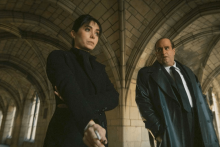
Over the course of the HBO series The Penguin, Sofia Gigante transforms from abused daughter of Gotham City mobster Carmine Falcone to a proper supervillain, the head of her own crime family. Sofia has chosen a new surname for herself. By going from Falcone to Gigante, she signals that she’s different from her father. Sure, Sofia’s still committing crimes (like he did) and killing people (like he did), but she's convinced there’s something righteous in her ascension: Her rise to power represents a rejection of the misogyny that’s always plagued her.

Perhaps more than any other medium, books can simultaneously sharpen our suspicion and enlarge our imaginations. Sojourners’ best books of 2024 do both with style.

“What happens when strangers meet?” is the driving question of the Silkroad Ensemble, an instrumental group conceived in 1998 by cellist Yo-Yo Ma. Musicians from around the world connect and communicate through music in response to this question. Lines between East and West, classical and folk blur as musicians work together to give old sounds new life. When musician and historian Rhiannon Giddens became artistic director of Silkroad in 2020, she focused the musical conversation on railroads. What emerged, and is still emerging, is American Railroad: A Musical Journey of Reclamation — a multiyear collaborative project including performances, residencies, an album, and a podcast exploring the untold stories of the people who helped lay the tracks connecting the United States.

The films below feature characters — real and fictional — who doubt, who sin, who ask for forgiveness, and who try to carry on and seek justice in a universe full of violence, corruption, and sickness, but also humor, love, and reconciliation.
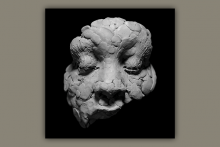
I WANT TO believe there’s a live band at a church somewhere in the U.S. playing Joy Oladokun’s latest album, Observations From a Crowded Room. After all, Oladokun is no stranger to sanctuaries: By the time she was 16, Oladokun was leading the worship music at the charismatic nondenominational church her family attended. But around the age of 24, she quit, explaining in an interview with NPR, “I just felt like so much of my attention was going towards taking care of people and singing the right songs and not saying the wrong thing on Sunday.”
I think, for a long time, I’ve been looking for a church willing to risk singing the wrong thing on Sunday—to risk singing something like these lyrics from Oladokun’s “Dust/Divinity”: “I’m a skeptic who still prays / ... ’Cause though it hurts me to believe / It kills me not to / And I am trying to find my way through the middle / And I am desperate to receive every good thing / From now until eternity / From dust until divinity.”
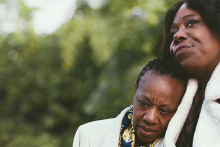
Love is Patient
In the film Hard Truths (written and directed by Mike Leigh), the main character yells at strangers — Pansy is angry at the world. But her sister Chantelle sees the sadness behind the rage, offering Pansy the unconditional love we all need: “I don’t understand you,” says Chantelle, “but I love you.” Bleecker Street Media
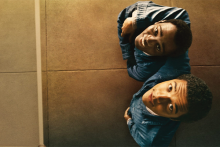
Trauma changes your memories. When I think of traumatic experiences in my life — what happened, how I felt before that moment, how I felt afterward, the changes I’ve noticed in myself since — they often play in short bursts. Those bursts are rarely sequential, and the length of time they last depends on how long I allow myself to linger on a memory.
Filmmaker RaMell Ross’ Nickel Boys, an adaptation of Colson Whitehead’s 2019 Pulitzer Prize-winning novel, is a record of trauma. It tells the story of two Black boys’ experience at an abusive reform academy in Jim Crow-era Florida. The fictional Nickel Academy is inspired by an actual place, Florida’s Dozier School for Boys, where students received brutal treatment at the hands of staff. A 2012 investigation by the University of South Florida uncovered dozens of human burial sites on the property.
Ross does something unique with this story about trauma, memory, and how they relate to each other: He makes it feel authentic.